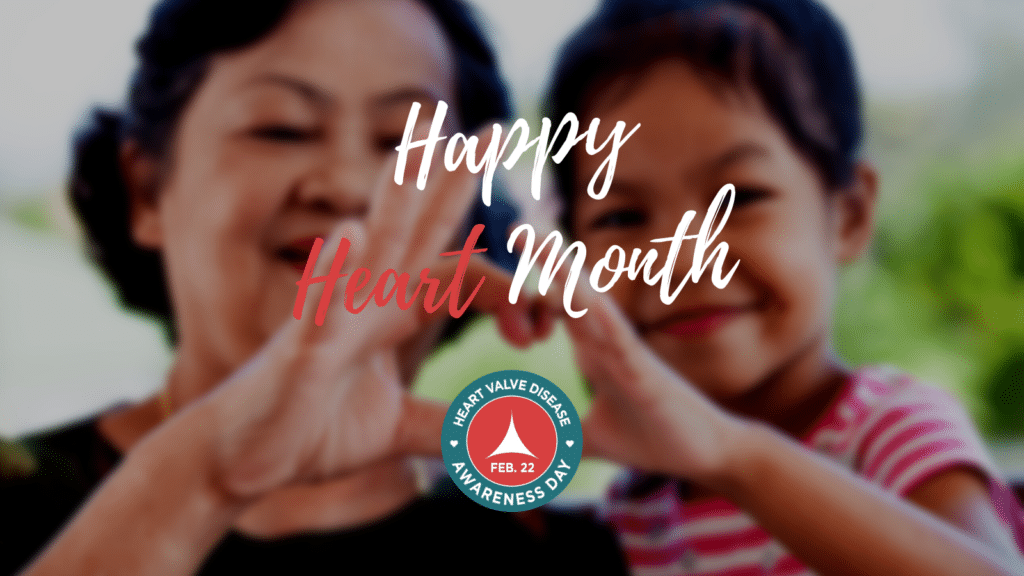‘Listen to Your Heart’ this Heart Month to Understand Your Risk for Common, Often Fatal Disease
Published February 1, 2024
Heart Valve Disease Awareness Day is February 22

Washington, DC (February 1, 2024) – Today officially kicks off Heart Month, a time to raise awareness of heart conditions and heart healthy lifestyles. On February 22, organizations, advocates, and individuals across the globe will mark Heart Valve Disease Awareness Day by joining together to increase recognition about the risks of heart valve disease and improve detection and treatment access to ultimately save lives.
About Heart Valve Disease Awareness Day:
- 125 organizations across the U.S. and around the world will mark Heart Valve Disease Awareness Day on February 22, 2024.
- Valve Disease Day activities involve heart screenings with stethoscopes, story sharing, educational events, social media campaigns, and more.
- Call to action: Get your heart listened to by a medical professional to detect signs of heart health challenges.
- Visit ValveDiseaseDay.org to learn more and access free resources (many translated in Spanish and French), and graphics to accompany news stories.
- Follow #ValveDiseaseDay and #ListenToYourHeart on your favorite social media platform.
About Heart Valve Disease:
- Heart valve disease occurs when one or more of the heart’s four valves is defective or damaged, interrupting blood flow and often causing serious complications, including death.
- More than 11 million Americans have heart valve disease.
- More than 25,000 deaths are attributed to valve disease in the U.S. each year.
- More than 84 million people around the world are impacted by heart valve disease.
- Symptoms can include lightheadedness or fainting, irregular or fluttering heart or chest pain, tiredness, edema, and feeling off in general or missing out on daily activities.
- Heart murmurs—or irregular heart sounds that are common with valve disease–can usually be detected through a simple stethoscope check. If a murmur is detected, additional tests such as an EKG, ECG, chest X-ray, or MRI can diagnose valve disease.
Valve Disease Risk Factors:
- Age is the greatest risk factor of valve disease: 1 in 10 people 75 and older are estimated to have moderate or severe heart valve disease
- Other cardiovascular diseases and conditions such as previous heart attack, hypertension, and high cholesterol
- Diabetes
- Treatments for certain types of cancer
- Congenital abnormalities
- People in communities of color tend to develop heart valve disease at a younger age and should be screened sooner due to this higher risk
Expert Quotes:
- “While heart valve disease affects more than 11.6 million Americans and causes an estimated 25,000 deaths each year, public awareness and understanding of the condition is shockingly low,” says Lindsay Clarke, JD, Senior Vice President of Health Education and Advocacy for the Alliance for Aging Research, adding that a survey by the Alliance found that three out of four people know little to nothing about heart valve disease, leaving too many going undiagnosed and untreated. “The good news is that while heart valve disease can be serious, early detection with a simple stethoscope check can lead to diagnoses, successful treatment, and many saved lives.“
- “We know that a simple stethoscope check by a medical professional can save lives, so we’re asking everyone to get their heart listened to and encourage their loved ones to do the same,” Lindsay Clarke, JD, Senior Vice President of Health Education and Advocacy for the Alliance for Aging Research.
About the Alliance for Aging Research
Since 1986, the Alliance for Aging Research has served as a trusted source of health information for both consumers and health care professionals on diseases and conditions that disproportionately affect older adults and has led numerous successful advocacy campaigns promoting the health and independence of older adults. Recognizing the seriousness of heart valve disease, and the fact that disease symptoms are often difficult to detect or dismissed as a normal part of aging, the Alliance is leading this effort to raise awareness through Heart Valve Disease Awareness Day. Learn more about the Alliance at www.agingresearch.org.
##
To interview someone from the Alliance for Aging Research or one of our 125 partner organizations on the topic of heart valve disease and awareness day activities, email Katie Riley, Vice President of Communications, at [email protected].
